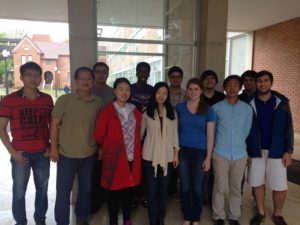I am sorry to announce that our friend and colleague professor Jian He has passed away. Jian was a prolific scholar, caring teacher, conscientious academic  citizen and most importantly a good friend.
citizen and most importantly a good friend.
Jian earned his Ph.D. from the University of Tennessee and came to Clemson as a postdoc in 2004. In 2008, he joined the faculty of the Department of Physics and Astronomy as an assistant professor and climbed the ranks to full professor in 2021. Jian was a prolific scholar who published more than 257 peer-reviewed papers on a variety of topics in condensed matter physics. The esteem in which he was held by his colleagues is reflected by the large number of invited talks he has presented at conferences around the world. His collaborators spanned North America, Europe and Asia. He was also selected as a member of the board of reviewing editors for the journal Science. He mentored countless numbers of students in his lab and had a particular passion for undergraduate research. Condolences have been pouring in from students and colleagues around the world.
In addition to his excellence as a scholar, he was a caring mentor to his graduate and undergraduate students. His students have been recognized with numerous awards and honors from the Barry M. Goldwater Scholarship, the Astronaut Scholarship Foundation and the NSF Graduate Research Fellowship Program. Jian went above and beyond in providing the signature Clemson Experience for students.
We physicists have a reputation for having a bit of an ego, and Jian certainly earned the right to one. But perhaps no other scientist I’ve ever known has done more to shatter that stereotype. Jian was kind, helpful and unfailingly gracious. A few years ago, I hurt my ankle and Jian happened upon me while I was limping to my car. He told me to wait where I was, and he would be right back. He ran back to Kinard and a few minutes later came back with a pair of crutches. He told me he kept a set in his office for times when he sprains his ankle playing soccer (his other passion). This is just one of many stories we could tell that exemplify his kindness.
Jian will be missed but not forgotten. His example will serve as motivation to pursue excellence in our scholarly and teaching efforts as well as in showing kindness to those around us. To honor this passion for student engagement, we have established the Jian He Memorial Fund to provide support to undergraduate research in our department. Gifts can be sent to the Clemson University Foundation, P.O. Box 1889, Clemson SC 29633-1889 or call 864-656-5896. Online gifts can be made here.

